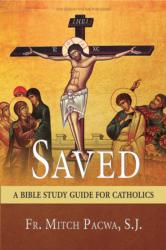 “Saved: A Bible Study Guide for Catholics”
“Saved: A Bible Study Guide for Catholics”
by Father Mitch Pacwa, SJ.
Our Sunday Visitor (Huntington, Indiana, 2017).
176 pp., $9.95.
In the 50-plus years since the publication of the Second Vatican Council’s Dogmatic Constitution on Divine Revelation (“Dei Verbum,” Nov. 18, 1965), Scripture has become a more prominent part of Catholic life, and more Catholics pray with Scripture and participate in parish Bible study programs. But it’s probably fair to say that there is still plenty of room for improvement in this regard.
A book such as this one is welcome, especially because it is designed for both individual and group use. You don’t need to join a Bible study class to benefit from this book; you can go through it on your own.
This volume, on salvation, is the latest in Jesuit Father Mitch Pacwa’s theme-based Bible study guide for Catholics. Earlier volumes focused on St. Paul, faith, the Eucharist, Mary, mercy and the Holy Spirit. This approach has the great advantage of helping Catholics to see the intimate connections between Scripture and various aspects of Catholic life and faith. Father Pacwa organizes his material into six “sessions” that examine the theme of salvation from six complementary scriptural perspectives, e.g. “The Role of Baptism and the Eucharist in Salvation” and “The Necessity of a Christian Spiritual Life for Salvation.”
[hotblock]
If some approaches to Bible study, particularly in groups, have a weakness, it’s the tendency to have everyone read a scriptural passage and then simply invite each participant to share with the group what he or she thinks that passage means with no input from a resource with some scholarly and/or ecclesial authority. Father Pacwa’s book provides this kind of input because he has academic credentials to support his commentaries. Additionally, he writes with a lively style. Each session includes quotations and other insights from various Catholic sources. At the same time, Father Pacwa gives participants using the book numerous opportunities to share their own reflections and insights.
If there is one characteristic of this book this reviewer finds perplexing it’s Father Pacwa’s choice to use three different translations of the Bible: the Catholic edition of the Revised Standard Version, the Revised Standard Version — Second Catholic Edition, and the New American Bible, Revised Edition. Yes, looking at various Bible translations can shed light on a given passage or word as translated from the original Greek or Hebrew. But for study purposes, limiting one’s attention to one translation or, indeed, one edition — such as the admirable Catholic Study Bible edition of the official American Catholic New American Bible, Revised Edition, is likely to short-circuit unnecessary debates about which translation is “best.”
Regardless, however, “Saved” is a fine Bible study resource and one that deserves a high recommendation.
***
Finley is the author of more than 30 books on Catholic themes, including “What Faith is Not” (Sheed & Ward) and an updated edition of “The Rosary Handbook: A Guide for Newcomers, Old-Timers, and Those In Between” (Word Among Us Press).
PREVIOUS: ‘Hostiles’: The guilt of a nation writ on every heart
NEXT: ‘Den of Thieves’ fails to steal the show



Share this story